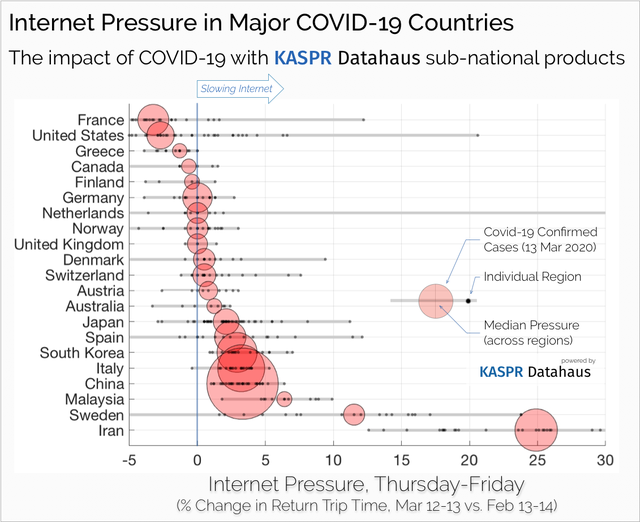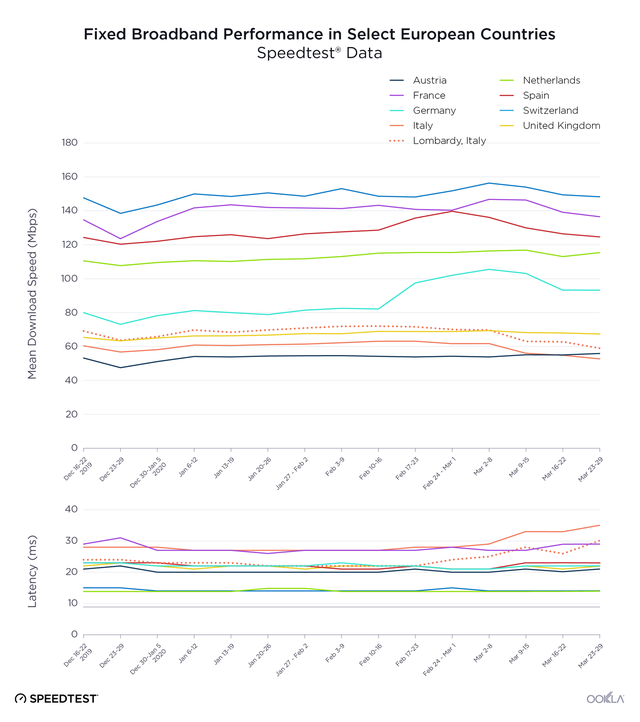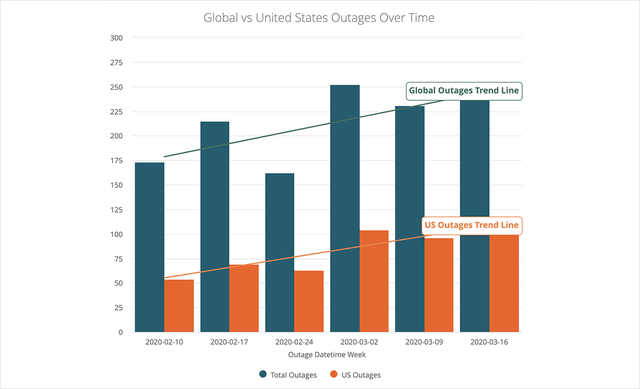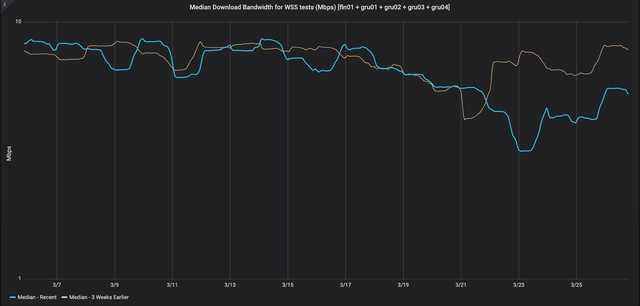Many organisations are measuring the impact of the COVID-19 crisis on Internet performance: in this article, we look at four recent reports.
At the RIPE NCC, we are continuously collecting Internet measurements in addition to running our own using RIPE Atlas.
We have recently published many reports on the impact the COVID-19 crisis has had on the performance of Internet infrastructure.
To see what effect this is having on Internet users, here we took a look at measurement reports coming from other, non-vendor specific, organisations. Please note that most of these are commercial companies, so the data is not open nor publicly available, but the original reports are linked below.
KASPR Datahouse
In a recent blog post, KASPR Datahaus discusses how COVID-19 is stressing Internet infrastructure in various countries.

Figure 1: Countries coping or failing to handle the Internet Pressure of Covid-19, as of 13 March 2020
In their analysis they say: "As can be seen, as the COVID-19 lockdowns take hold under heavy caseloads, the Internet certainly shows signs of significant pressure, and in some regions, it seems that pressure is leading to crippling online experiences.
The pattern for Japan, Spain, South Korea, Italy, and China shows a strong correlation with COVID-19 cases, lockdowns, and Internet pressure.
Sweden also seems an outlier of a different kind. Whilst it has not had the same caseload of some European counter-parts further south, the Scandanavians have certainly acted strongly to limit movement. And, it would seem from our measurements, Swedish Internet capacity is already showing signs of difficulty with median slow-downs across its regions of over 10%." Source, 15 March
SpeedTest
On their blog Speedtest is tracking COVID-19’s impact on global Internet performance.

Figure 2: Broadband performance in some European countries
Speedtest says: “Mean download speed over fixed broadband showed continued declines in Italy, France, Spain and Switzerland during the week of March 23.
Fixed broadband download speed increased slightly in the Netherlands and remained relatively flat in Austria, Germany and the U.K. during the week of March 23.
Mean download speed over mobile declined in Italy, the Netherlands, Switzerland and the U.K. when comparing the week of March 23 to that of March 16. Austria and Spain saw very slight increases in mobile download speed during the week of March 23 while France and Germany saw little change week over week.” Source, updated 30 March
ThousandEyes
Also, ThousandEyes published a State of Internet Health during COVID-19.

Figure 3: Network outages within ISPs, public cloud, UCaaS, and edge service providers
In this article, ThousandEyes states: “Despite massive traffic increases — particularly across consumer last-mile networks — we have not seen a significant corresponding spike in Internet outages, which can occur when traffic levels strain network capacity. However, there has been an upward trend line in outages over the last three weeks compared with the previous three-week baseline. “ Source article, 23 March and The video report, 30 March
Measurement Lab (MLab)
MLab keeps track of changes related to COVID-19.

Figure 4: Median Download Bandwidth for WSS tests (Mbps)
You can find this in their blog where Mlab reports: “Median Download Bandwidth for WSS (Secure WebSockets) tests (Mbps): The points of lowest performance between March 23rd and March 25th correspond to the periods of highest demand. Compared to 3 weeks earlier, the download performance has dropped. “ Source, updated 1 April
Conclusion
All these measurements show that the Internet is resilient enough to keep functioning under the additional usage, even if many markers of the performance have been influenced: download speeds have dropped, and there are more outages.
Please let us know in the comments if you found this report useful. You can also share your analysis or any questions or comments. And #StaySafe!





Comments 3
The comments section is closed for articles published more than a year ago. If you'd like to inform us of any issues, please contact us.
Sandrine •
Hello, For those who can read French I recommend this article by Stéphane Bortzmeyer on Framablog: https://framablog.org/2020/03/21/linternet-pendant-le-confinement/ In the article he underlines the business considerations that underlie the recent media bubble about Internet saturation.
Mirjam Kühne •
Olivier Bonaventure sent this to the mailing list: Thanks for this interesting blog post. Looking at the impact of Covid in Europe, you might also be interested in the following blog post: https://www.tessares.net/how-is-your-broadband-coping-with-covid-19/ Only possible solution to cope with the growth of the bandwidth requirements is to combine xDSL and 4G. Several countries have deployed such hybrid access networks in Europe, mainly in rural areas where the xDSL bandwidth is limited. If you need additional information let me know Best regards, Olivier Bonaventure
Business Broadband NZ •
This is really appreciated that you have presented this data over here, I love all the information shared. It will be very helpful to understand about internet measurements in the time of corona. Great post to share, thanks for publishing this here!!